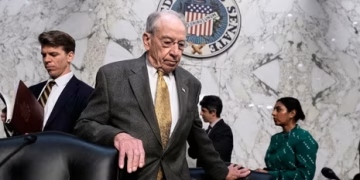By Eva Richardson | The Logistic News
April 9, 2025
In a rare show of bipartisanship, U.S. Senators from both sides of the aisle have introduced the Trade Review Act of 2025, a legislative proposal designed to reestablish Congressional authority over tariff decisions. The bill emerges amid growing concerns over the economic ripple effects of executive-imposed trade measures, including inflation, supply chain volatility, and market instability.
Reclaiming Congressional Oversight in Trade Policy
The Trade Review Act—championed by Senators Michael Bennet (D-Colo.), Maria Cantwell (D-Wash.), and Chuck Grassley (R-Iowa)—would require any new tariffs proposed by the executive branch to gain Congressional approval within 60 days. Without such approval, the tariffs would automatically sunset.
“This is not about politics. It’s about balance,” said Senator Grassley. “The Constitution places the power of trade and tariffs with Congress, and we intend to restore that authority.”
Senator Cantwell emphasized the economic imperative: “Small businesses, manufacturers, and farmers are all feeling the pressure. We need to ensure that tariffs are considered with a clear understanding of their long-term consequences.”
Economic Fallout Spurs Legislative Action
The bill follows a series of aggressive tariff measures introduced by President Trump, including new levies on Chinese goods and an expansion of Section 301 tariffs. These moves have drawn sharp criticism from the business community, which cites rising costs and uncertainty as critical threats to growth.
Several industry groups—including the American Apparel & Footwear Association and the National Retail Federation—have endorsed the Senate initiative, calling for predictability and transparency in tariff policymaking.
Political Headwinds and Presidential Resistance
Despite bipartisan momentum in the Senate, the bill’s future remains uncertain. President Trump has already signaled a veto threat, citing the need for unilateral flexibility in trade negotiations. Senate Majority Leader John Thune (R-S.D.) has expressed doubts about the bill’s viability, while House Speaker Mike Johnson (R-La.) has not committed to advancing similar legislation.
To override a presidential veto, the bill would require a two-thirds majority in both chambers—an uphill battle given current party divides.
Industry Implications: Logistics in the Crosshairs
For the logistics sector, the implications of unregulated tariffs have been profound. Unpredictable duties have disrupted freight flows, altered sourcing patterns, and led to increased warehousing costs. Freight forwarders and carriers are pushing for more stability in the policy environment.
“The logistics industry thrives on consistency,” said a senior executive at a major 3PL firm. “When tariffs change overnight, entire shipping routes and inventory strategies are thrown into chaos.”
Conclusion: A Critical Fork in the Road
As global trade becomes increasingly politicized, the Trade Review Act represents a pivotal moment for American governance. Whether or not the bill becomes law, it highlights the growing desire within Congress—and across the economy—for a more deliberate, accountable approach to trade policy.
For expert analysis on how trade legislation is reshaping global logistics, follow Eva Richardson and The Logistic News on Google News and LinkedIn.























